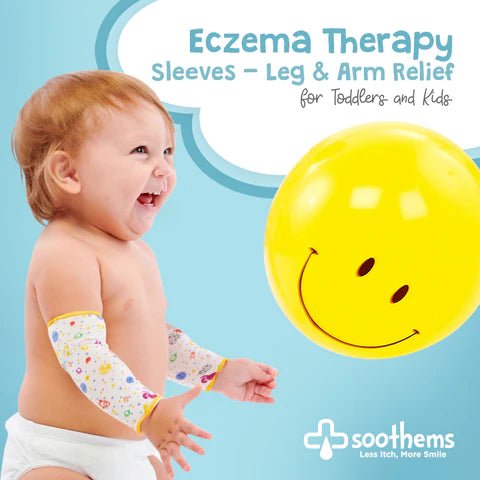What does the diet, and possible food allergies have to do with eczema? And can I really use daily diet to minimize my child’s eczema flare-ups?
As children head back to school this fall an estimated 20% of the students will suffer from some degree of mild, to moderate to severe eczema (the common name) / atopic dermatitis. With 1000’s of possible eczema triggers, no known cure for atopic dermatitis, what can I do for my kid to help minimize an eczema reaction or flare-up as they are commonly called?
Eczema or (atopic dermatitis) is the medical label used to describe a wide range of skin inflammations or dermatitis conditions. On the one hand, children suffering from eczema is extremely common but the way it affects different people and what causes flare-ups are very different. Some different types of dermatitis are contact, nummular, irritant and contact eczema.
A wide-ranging eczema trigger is a diet:
It has been well documented that eczema suffers frequently have both simple and complex food allergies. It is important to note that eating certain foods does not cause eczema but may have a trigger effect in people with an existing disposition for eczema and cause an eczema flare up through consumption. Because everyone is so different food allergies can be especially difficult to determine and at the same time, there are certain foods that help keep eczema under control.
Here are six common foods that have been determined to have a definitive connection to people suffering from eczema / atopic dermatitis that are known to trigger eczema allergic reactions and should be avoided to reduce the risk of an eczema reaction or flare-ups:
- Diary (cow milk)
- Nuts
- Eggs
- Gluten (wheat)
- Certain fish and shellfish
- Soy-based proteins
Be a label reader to avoid allergic reactions and eczema flare-ups
No two people are the same and some will have varied reactions to the consumption of the same type of food. Here are a couple of other dietary recommendations to avoid that are likely to increase the possibility of an eczema flare-up:
- Foods with preservative additives and artificial ingredients
- Foods rich in trans-fats such as margarine, processed foods, and fast foods
- High-sugar foods and drinks will cause a rise in insulin levels, which can lead to inflammation.
Recommended foods to help control eczema flare-ups
Given the medical and scientific connection to dietary consumption, it makes sense to develop an eating plan and regular daily diet with these recommended foods for an individual to try and help control eczema flare-ups. Helping to control eczema through diet will, however, require the discipline to make sound choices in planning your menu, and this must be done consistently for maximum benefits.
Here are the top recommended foods that have been shown to help control eczema:
Foods with Probiotic Content
Foods rich in probiotics ensure the strength of the immune system. A reliable system can reduce allergic reactions and flare-ups. With the benefits of a robust immune system not benefiting only those trying to use diet to control eczema, consistent intake of all foods that aid the immune system remains crucial for everyone.
Foods rich in probiotics include:
- Soft cheeses, like Gouda
- Sourdough bread
- Miso soup
- Naturally fermented pickles
- Tempeh
- Kefir
Vegetable or Bone Broth
Vegetable broth or bone broth is rich in glycine, collagen, calcium, and magnesium. It is a natural source of collagen which can support skin elasticity and moisture. It can also boost liver detoxification to reduce inflammation and strengthen the immune system.
Fatty Fish
Fatty fish are a necessary part of your diet. The Omega-3 fatty acids in fish oil have clinically proven anti-inflammatory qualities.
Foods Rich in Quercetin
As a plant-based flavonoid (plant compounds with antioxidant qualities), quercetin is a vital component found in fruits, flowers, and vegetables. It is the component responsible for their vibrant color. Apart from its benefit as an antioxidant, it is an effective antihistamine. This quality makes it essential in reducing inflammation and lowering histamine levels in your body.
Foods with good quercetin content include:
- Blueberries
- Apples
- Kale
- Broccoli
- Spinach
- Cherries
Making your child more comfortable living with eczema is a parental priority!
Following a strict diet takes discipline and is hard work. Eating these foods and avoiding the identified allergic triggers does not cure or prevent eczema flare-ups but strong and documented evidence has shown that having a planned daily diet eating these types of foods and avoiding the triggers will help minimize the frequency and severity of an eczema flare-up.
Eczema Clothing and Eczema Pajamas
There is a helpful solution to reduce itching, keep the skin of an eczema baby cool, the moisture levels balanced while covering topical emollients dry or with wet wrapping - eczema clothing. Especially helpful are our baby eczema pajamas. Soothems toddler eczema sleepwear has functional features such as satin no scratch mittens to cover fingers. Made from a special TENCEL blend of fabric called TEWLTect skin smart fabric for eczema using anti-inflammatory Chitosan and Zinc Oxide these eczema clothes are doctor recommended and can be paid for using HSA, FSA or submitted to Health Insurance. Checkout Soothems!









Leave a comment
All comments are moderated before being published.
This site is protected by hCaptcha and the hCaptcha Privacy Policy and Terms of Service apply.